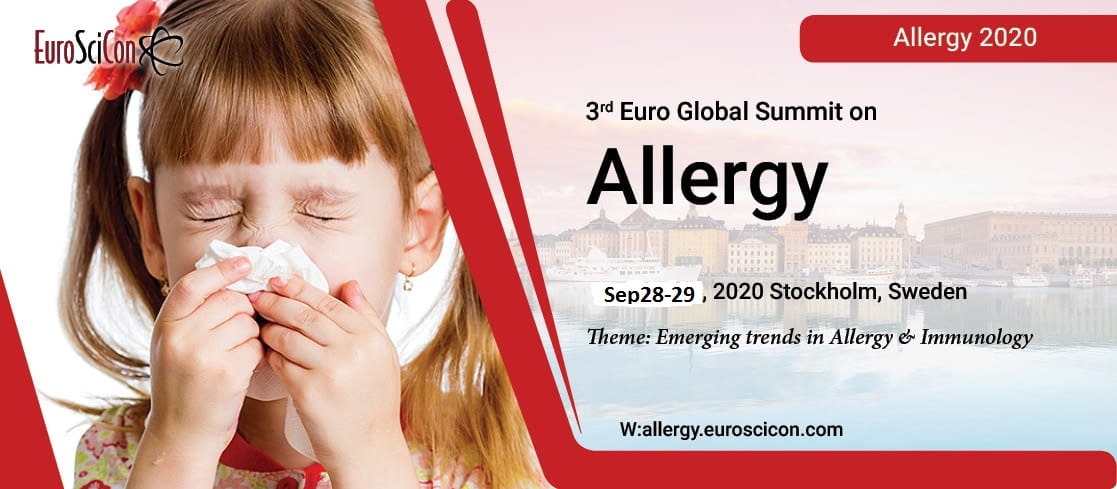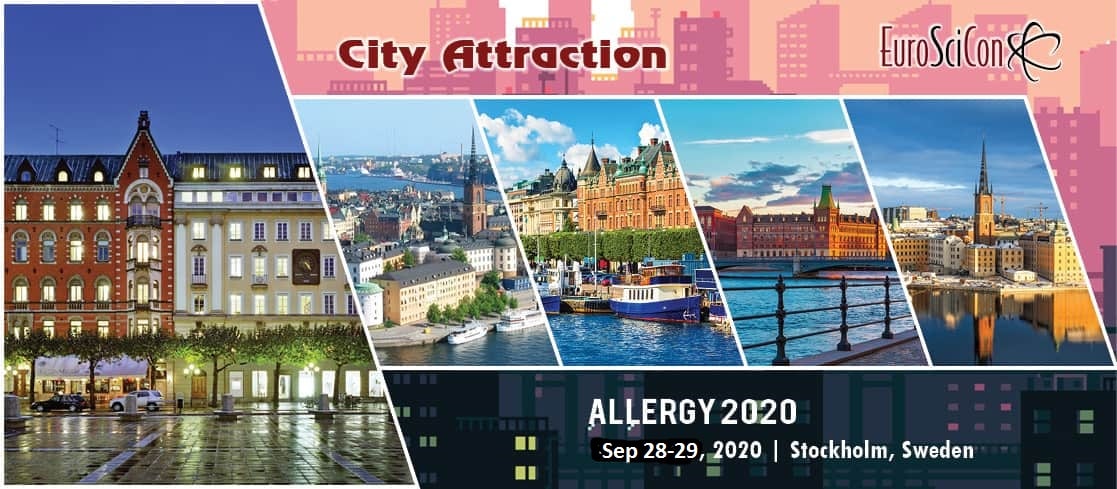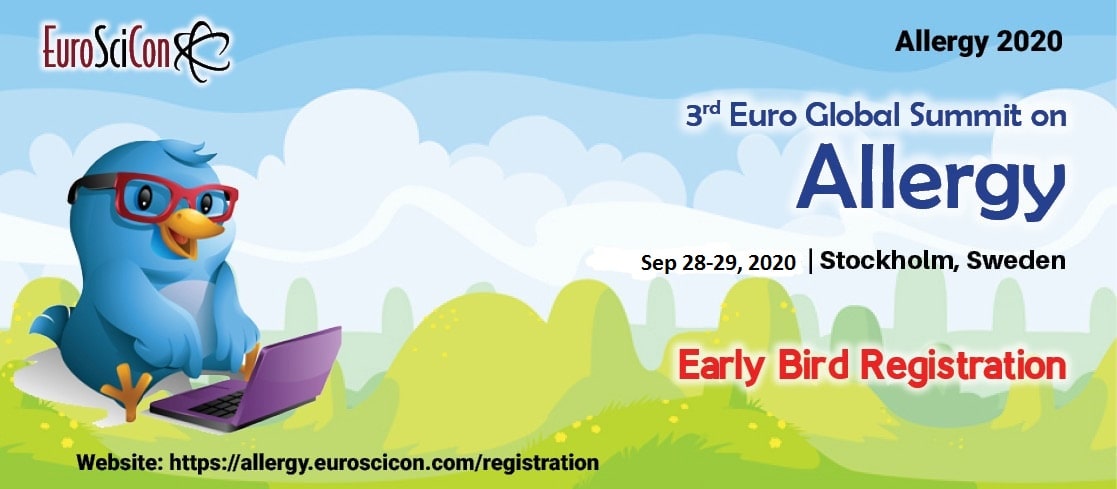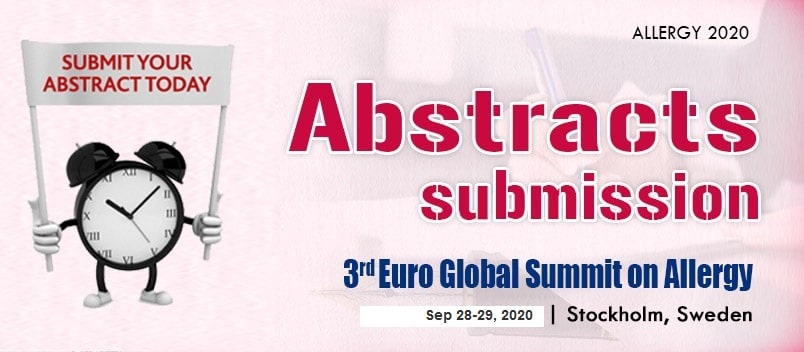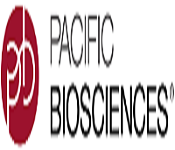Allergy 2020
Invitation
Hear Explore and learn the latest research. Present before distinguished Immunology audience. Collaborate, build partnerships and experience Stockholm. Join the Allergy & Immunology Experts
We are pleased to invite you all to the 3rd Euro Online Conference on Allergy which will take place on Sep 28-29, 2020 in Stockholm, Sweden hosted by Euroscicon. But as per the current situation Conference is going take place through WEBINAR
The conference will bring together Allergy & Immunology Researchers and practitioners from more than 40 nations to share their knowledge, experience, and expertise through a series of Key Notes, Plenary Talks, Workshops, Symposiums, and Exhibitions. The theme of this year conference is “Emerging trends in Allergy & immunology” and the audience is expected from wide disciplines which include but not limited to Allergy & Immunology, Asthma, Skin & Food Allergy, Vaccines & Infections, Paediatric Allergy, and Drug Allergy, Allergy & Immunology researchers and other experts working in the related area of Allergy & Immunology to share their experience at the global platform.
Stockholm a gorgeous city with many hidden secrets poses one of the world’s most promising destinations to visit and experience the special tourist attractions. Attending and contributing to the conference will definitely enhance your cultural and scientific experience and open further opportunities for you and your career.
We look forward to welcoming you to Stockholm, Sweden.
With Best Wishes,
Organizing Committee
About Conference
After a successful conference in 2019, Euroscicon is very delighted to invite you all to the “3rd Euro Global Summit on Allergy" (Allergy 2020) scheduled on May 04-05, 2020 at Stockholm, Sweden. We are progressively working for the initiation of new world, perspectives and views in the field of Allergy. Euroscicon is providing a great platform for thousands of Allergy & Immunology meet, learn, share and exchange views. We are concentrating on a view that everyone should gain from the conference. So, we are organizing plenary sessions, poster exhibitions and section programs, workshops at the conference.
We invite all the Immunologist, Allergy researchers, and researchers in the field of Drug Allergy, Skin Allergy, Paediatric Allergy, Infections & Vaccines, Immunology Disorder people who show their interest to explore their research, case studies and practitioners of Allergy & Immunology 2020
This International meet suspects many representatives including worldwide keynote addresses and oral presentations by eminent speakers and notice presentations by understudies, Exhibitions and delegates all around the globe which will make a stage for worldwide advancement of sheltered and viable common treatments. It gives global systems administration and chances to joint efforts with overall organizations and businesses.
Allergy 2020 will focus on basic analysis of the economic aspects of Immunology & Allergy, with a deep focus on the costs/ inputs and consequences/outcomes of immunology interventions. It is used to complement traditional clinical development information such as efficiency, safety, quality etc., to guide decision makers regarding patient access to definite drugs and services. It also covers the multidisciplinary field of allergy, immunology disorders, allergy & inflammation, paediatric immunology, ENT allergy, Ocular Allergy, Asthma triggers & Stages , and home care
Euroscicon has an enhanced and highlighted features of scientific partnerships and alliances with development agencies, Institutes, leading research organizations, non-government organizations, and other entities to promote the development-oriented research across the globe through live streaming, B2B and Scientific Meetings. Euroscicon Allergy Conferences provides an excellent opportunity for the budding scientists and young researchers through its special initiatives like Young Researcher Forum, Poster Presentation and E-poster. Euroscicon Organizes 300+ Scientific Conferences every year across USA, Europe & Asia. Besides 500 Peer reviewed, Open Access Journals, Euroscicon has collaborated with more than 1000 Scientific Associations and institutions worldwide to promote information on health care and technologies. These journals are enjoying the support of over 5 million readers; a team of 30.000 eminent scholars are providing editorial support.
Sessions and Tracks
Drug allergies are a set of symptoms caused by an allergic reaction to a drug. A drug allergy encompasses an immune response in the body that develops an allergic reaction to a medicine. If you develop a rash, hives or difficulty breathing after taking certain medications, you may have a drug allergy. As with other allergic reactions, these symptoms of drug allergy can occur when your body’s immune system becomes sensitive to a substance in the medication, identifies it as a foreign invader and releases chemicals to defend against it.
Food allergy is caused when the body falsely makes an antibody (IgE) to fight against a specific food. When the food is next (or sometimes is just in contact with the skin) it provokes an immune system response which results in the commute of histamine and other substances in the body. These cause various symptoms, depending on where in the body they are exposed. For example, in the gut they may result in abdominal pain, vomiting and diarrhoea; in the skin, itching and swelling (rash or nettle rash), in the upper airways, a runny nose or sneezing; in the lower airways, a wheeze or cough.
Allergy Conferences | Immunology Confereces | Asthma Conferences
The eye, like the respiratory tract, can be a site of acute allergic reactions. Ocular allergy also called Allergic conjunctivitis occurs when something allergic to irritate the conjunctiva. This is the sensitive membrane covering the eye and the inside of the eyelid. As all allergies, allergic conjunctivitis starts when the immune system recognises an otherwise innocuous substance as an allergen. This causes your immune system to overreact and produce antibodies called Immunoglobulin (IgE). These antibodies drive to cells that release chemicals which cause an allergic reaction. In this case, allergic reactions include eyes that water, itch, hurt or become red or swollen.
Irritated skin can be caused by a many factors. These include immune system disorders, medications and infections. When an allergen is responsible for initiating an immune system response, then it is an allergic skin condition. When skin is contacted by a substance, body’s immune system is triggered thinking the substance as a foreign agent, because of this skin becomes sensitive & develops allergy. Contact with substance such as detergents, soaps or cleaning supplies causes skin allergy.
Allergy Conferences | Immunology Confereces | Asthma Conferences
Allergy affecting Ear, Nose, and Throat comprises ENT allergy. Seasonal as well as long lasting allergies can contribute to enduring sinusitis, bronchitis, as well as ear problems. Allergies are diagnosed through the patient's history, physical examination as well as allergy testing. Once the distinct allergens are identified prevention techniques as well as immunotherapy can be used in addition to antihistamines in order to obtain optimal results.
- Allergic rhinitis
- Otorhinolaryngology
- Rhinitis
- Allergic salute
Allergy Conferences | Immunology Confereces | Asthma Conferences
The invasion of foreign organism on a host body for its growth and multiplication is termed as infection. The infection can lead to infectious diseases/ transmissible disease/ communicable disease. The infection can be caused by any infectious agents and their toxins causing several immune reactions like allergy, inflammation etc. Immune or allergic reactions arise upon infection due to the role of Host immune system to maintain immunity in the body. The infectious agents may be bacteria, virus, fungus, parasites, protozoans etc. As the agents vary, so does the route of transmission to enter into the host body and also the diseases, diagnosis and treatments. The immunity of an individual must be well enough to combat such infections. Immunity will be innately present in an individual from the mother through placenta and also later on through breast milk. Immunity will also be acquired by an individual during his/her lifetime through exposure to several allergens, microorganisms and foreign substances.
Effects of infectious disease
- Infectious agents and route of transmission
- Infectious diseases: diagnosis & treatment
- Cellular and hormonal immunity
- Virology and Infectious Diseases
- Bacteriology and Infectious Diseases
Allergy Conferences | Immunology Confereces | Asthma Conferences
5. Allergy Prevention & Risk Factors
Allergies can be prevented by identifying & avoiding the ones which cause allergy to the body. One of the biggest causes of allergy is house dust mites, pets, mould spores, food allergies, insect bites stings, when trying to identify what causes or deteriorate your allergic symptoms, track your activities and what you eat, when symptoms occur and what seems to help. Host factors responsible for risk of allergy are heredity, sex, race and age. Exposure to allergens has been identified as an influential environmental factor, whereas passive smoking and pollution may act as an adjuvant.
6. Allergy Diagnosis & Medicine
Allergic diseases are the outcome of allergic inflammation that occurs as a result of an interaction between the environment and the patient's immune system resulting in the release of histamine and other pro-inflammatory mediators. Knowing exactly what body is allergic to can help lessen or prevent exposure and treat the reactions. Laboratory investigations are a useful tool in the diagnosis and management of allergic diseases and can provide aids to diagnose and assess disease activity.
- Patch test
- Antihistamine
Allergy Conferences | Immunology Confereces | Asthma Conferences
Allergy is one of the most adverse immune reaction faced worldwide by people which is next accompanied by inflammation. The set of conditions caused by Hypersensitivity of the immune system in response to any foreign substance is allergy/ allergic diseases. It may arise due to genetic or environmental factors. The causative agents are termed as allergen and they may be food, drug, dust, pollen, animal dander &fur etc. varying for each individual. Mostly allergen immunotherapy is the advanced therapeutics method to treat the allergies. Allergic and Inflammatory Reactions are caused by the immune system but if the reaction becomes adverse then the condition becomes chronic for an individual. The causative agents for such adverse reactions could be genetic, environmental, pathogenic and synthetic compounds. The localized body part which gets red, swollen, hot and painful after an injury or infection is an condition termed as inflammation and it might be due to allergy: Allergic inflammation or due to tumour. Inflammation can be acute or chronic and it consists of different types based on the part of inflammation.
- Immunoglobulin E (IgE)
- Role of histamine
- Anti-inflammatory medication
- Eosinophil-Associated Gastrointestinal Disorders
Allergy Conferences | Immunology Confereces | Asthma Conferences
The condition of swollen, inflamed and extra mucosal lung airways upon infections or exposure to allergen is asthma/ bronchial asthma and the epigenetics of asthma varies accordingly. Asthma is long term chronic inflammatory disease of the lung airways caused by any specific allergen (Allergic asthma) or any other genetic / environmental factor (Non-Allergic Asthma) involving symptoms like wheezing, coughing, breath shortness and chest tightness. Research is going in a rapid pace due to increase in the asthma attack cases, mostly in children (Pediatric Asthma). Asthma allergy immunotherapy and several advances in treatment can be discussed in allergy conference like this.
Chronic obstructive pulmonary disease or COPD is a set of chronic inflammatory lung disease. The disease is contributed by Emphysema and chronic bronchitis. Emphysema is the condition in which the alveoli get destroyed and chronic bronchitis is the condition where inflammation of the lining of the bronchial tubes takes place. People who smoke even after having asthma or people who have long term exposure to chemical fumes, vapours and dusts in the workplace, fumes from burning fuel for cooking and heating in poorly ventilated homes are at risk of developing COPD. Rare cause for COPD is genetic disorder: alpha-1-antitrypsin deficiency. COPD symptoms don’t appear initially hence research in COPD diagnosis in enhancing as misdiagnosis can increase the risk of COPD in the person cause heart disease, lung cancer and so on.
Types of asthma
- Chronic obstructive pulmonary diseases (COPD)
- Pediatric Asthma
- Treatments
Allergy Conferences | Immunology Confereces | Asthma Conferences
Allergies are among the most common conditions affecting children. Child’s immune system fights against infections. If a child has allergies, their immune system wrongly reacts to things that are usually harmless. Pet dander, pollen, dust, mold spores, insect stings, food, and medications are examples of such things. This reaction may cause their body to reciprocate with health problems such as asthma, hay fever, hives, eczema (a rash), or a very severe and unusual reaction called anaphylaxis.
Allergy Conferences | Immunology Confereces | Asthma Conferences
An allergic reaction to proteins found in an animal's skin cells, saliva or urine is veterinary allergy or Allergology. The pet hair, fur or proteins present in a pet's dander, skin flakes, saliva and urine can induce allergic reaction or cause asthma symptoms in some people. There are several case studies on pet allergies. Pet allergy is mostly seen towards cats and dogs as they are the most common pets worldwide. Cat allergy immunotherapy is widely used by cat lovers. Some cases have been seen where allergy reactions are seen to venom, bite and sting of insects and also to proteins found in animal products where the food allergy comes into picture too.
- Zoonotic bacteria
- Allergic Reactions to venom
- Parasite vaccines
- Veterinary viral vaccines
Allergy Conferences | Immunology Confereces | Asthma Conferences
Allergies are one of the most common chronic diseases. A chronic disease lasts a long time or occurs often. An allergy occurs when the body’s immune system sees a substance as harmful and overreacts to it. The substances that cause allergic reactions are allergens. When someone has allergies, their immune system makes an antibody called immunoglobulin E (IgE). These antibodies respond to allergens.
Allergy Conferences | Immunology Confereces | Asthma Conferences
Asthma medication plays a key role in how well you control your condition. There are two main types of treatment, each geared toward a specific goal.
Controller medications are the most important because they prevent asthma attacks. When you use these drugs, your airways are less inflamed and less likely to react to triggers.
Quick-relief medications -- also called rescue medications -- relax the muscles around your airway. If you have to use a rescue medication more than twice a week, your asthma isn’t well-controlled. But people who have exercise-induced asthma may use a quick-acting med called a beta-agonist before a workout.
The right medication should allow you to live an active and normal life. If your asthma symptoms aren’t controlled, ask your doctor to help you find a different treatment that works better.
Allergy Conferences | Immunology Confereces | Asthma Conferences
13. Asthma Triggers & Asthma Stages
As determined by the National Institutes of Health, the following is a guideline used by doctors to help determine the extent of asthma in your child. It is classified as "steps" because each child may step up or step down to different levels at any time.
The steps are as follows:
Step 1 or intermittent asthma: This group of children has symptoms no more than two times a week, do not have problems in-between flare-ups, and only have short flare-ups from a few hours to a few days. Night-time symptoms occur less than two times a month.
Step 2 or mild persistent: This group of children has symptoms more than two times a week, but not daily, and may have activity levels affected by the flare-ups. Night-time symptoms occur greater than two times a month, but no more than once per week.
Step 3 or moderate persistent: This group of children has symptoms every day, use their rescue medication every day, and may have activity levels affected by the flare-ups. Night-time symptoms occur greater than one time a week.
Step 4 or severe persistent: This group of children has symptoms multiple times per day, have a decrease in their physical activity, and have frequent flare-ups. Night-time symptoms occur frequently.
Allergy Conferences | Immunology Confereces | Asthma Conferences
14. Gastrointestinal immunology and allergy
The gastrointestinal tract is a lymphoid organ, and the lymphoid tissue within it is referred to as the gut-associated lymphoid tissue or GALT. Gastrointestinal allergy is an immediate hypersensitivity reaction of the digestive system after the ingestion of certain foods or drugs. GI allergy varies from food allergy, which can affect other organ systems. Distinctive symptoms constitute itching and swelling of the mouth and oral passages, nausea, vomiting, diarrhoea, severe abdominal pain, and in severe cases, anaphylactic shock. Gastrointestinal food allergy also urges a challenge to the clinician because of its mutable symptomatology and lack of accurate diagnostic tests.
Intercommunication between the immune system and the GI tract are being perceived as of growing importance, not only in GI function and health but also in their prominence on overall health.
Allergy Conferences | Immunology Confereces | Asthma Conferences
Often vaccination and immunization are used interchangeably but their meaning isn’t the same. The act of introducing vaccine to a body is termed as Vaccination. Immunization is the process through which the person/ animal gets protected against any disease. Vaccines are antigenic substances or biological preparations used to provide immunity against infectious diseases. Vaccines are several for different types of diseases like Mumps, Hepatitis, Diphtheria, Cholera etc
- Sub-unit vaccines
- Conjugate vaccines
- DNA vaccines
- Recombinant vector vaccines
Allergy Conferences | Immunology Confereces | Asthma Conferences
16. Immunotherapy & Transplantation
Immunotherapy is one of the preventive treatment method employed against allergy and other immune disorders like asthma, rhinitis, cancer etc. Immunotherapy used to treat cancer is cancer immunotherapy, to treat allergy is allergy immunotherapy, to treat allergic asthma is Asthma allergy immunotherapy, to treat food allergy is food allergy immunotherapy, to treat peanut allergy is peanut allergy immunotherapy. It can be activated, suppressed, helminthic, subcutaneous, sublingual and adjuvant immunotherapy.
The engraftment or transfer of cells, tissues or organs for the revival of body functions is transplantation and the process involves several types like Allograft, Xenograft etc. Several ethics and regulations are concerned with the process and as the number of allergy cases has increased after the transplant (Transplant-acquired allergy: TAA) the process is debated and researched for better solutions and reduced/nil allergic and immune reactions. Autologous hematopoietic stem cell transplantation (HSCT) has been used for treatment of severe immune diseases. Transplant surgery success rate is not a huge number with transplant complications and posttranplantation care but it still counts as an effort for the treatment of allergy and immune disorders.
- Immunotherapy types (Activation, Suppression, Helminthic and Sublingual)
- Subcutaneous immunotherapy (Allergy shots)
- Stem cells based immunotherapy
- Tumour immunotherapy
- Transplant-acquired allergy (TAA)
- Auto graft, Allograft, Xenograft and Isograft
- Transplant rejection and treatment
- Risks associated with transplant
Allergy Conferences | Immunology Confereces | Asthma Conferences
Disorders caused by the deficiency, failure or aberrant action of immune system or the malignant tumour growth in the immune system are immune disorders. They are several type’s namely immunodeficiency disorders (primary and secondary), Allergies and Autoimmune diseases. Allergy and inflammatory diseases are immune disorders caused by over reaction of the immune system. The diagnosis, prevention and treatment methods for all vary widening the research in medicine and immunology fields. So far the causes and treatment of several of these disorders is not discovered.
- Auto-immune diseases
- Rheumatoid arthritis
- Systemic lupus erythematous
Allergy Conferences | Immunology Confereces | Asthma Conferences
18. Clinical Immunology & Allergy
Clinical immunology is the branch of immunology which deals with the study of diseases caused due to the disorders in the immune system. The disorders may be failure or aberrant action of immune system and sometimes due to malignant growth of cellular and molecular components of immune system. Hence cellular biology, molecular biology fields of science come into picture. Immunology deals with the study of several components of immune system, the immune reactions and mechanisms. Clinical immunology and allergy is a specialty of renewed interest and untapped potential. It covers several fields like pathology, biochemistry, biotechnology, genetics, pharmaceuticals, medicine etc. The study of these fields give hope to research and taps career for immunologists, cell biologists, molecular biologists, biochemists, bio informaticians, allergists, physicians, microbiologists, paediatricians and so on. Allergy is the condition of adverse reaction of immune system towards any foreign substance. Allergy is of different types depending on the allergen (causative agent) and the diagnosis and treatment for each type varies.
Allergy Conferences | Immunology Confereces | Asthma Conferences
Immunology is the investigation of the invulnerable framework, which is in charge of shielding the body from outside cells, for example, infections, microorganisms and parasites. Invulnerable framework cells called T and B lymphocytes distinguish and demolish these trespassers. The lymphocytes typically perceive and overlook the body's own tissue (a condition called immunological self-resilience), however certain immune system issue trigger a glitch in the resistant reaction causing an assault without anyone else cells because of lost safe resilience.
Type 1 diabetes is an immune system illness that happens when the insusceptible framework erroneously assaults insulin-delivering islet cells in the pancreas. This assault starts a very long time before sort 1 diabetes ends up clear, so when somebody is analysed, broad harm has just been done and the capacity to create insulin is lost.
- Natural invulnerability and diabetes
- Biomarkers for illness organizing
- Test diabetes– Immune reactions and treatment
- Immunology of auto antigen-explicit methodologies and novel operators
- Ecological triggers affecting malady pathogenesis
- Beta cell science and safe connections
